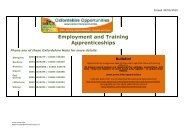Let's talk about⦠- Oxcentric
Let's talk about⦠- Oxcentric
Let's talk about⦠- Oxcentric
You also want an ePaper? Increase the reach of your titles
YUMPU automatically turns print PDFs into web optimized ePapers that Google loves.
• NHS Student Bursaries<br />
Many healthcare diploma or degree courses attract this type of<br />
funding – nursing, midwifery, operating department practitioners,<br />
audiology, chiropody/podiatry, dietetics, dental hygiene/therapy,<br />
occupational therapy, orthoptics, physiotherapy, prosthetics &<br />
orthotics, radiography/radiotherapy, and speech & language therapy.<br />
Those studying medicine or dentistry may be eligible for this type of<br />
funding from year 5 of their course onwards.<br />
For more information visit M www.nhsbsa.nhs.uk/students or<br />
T 0845 358 6655<br />
• Social Work Bursaries<br />
These are available for degree courses in social work. For further<br />
information see<br />
M www.nhsbsa.nhs.uk/students or<br />
T 0845 610 1122<br />
• Charities and Educational Trusts<br />
Students who meet specific criteria may be able to obtain small<br />
amounts of funding from charities and educational trusts. See useful<br />
resources and websites on pages 24-27.<br />
Also contact the Educational Grants Advisory Service via<br />
M www.family-action.org.uk or T 020 7241 7459<br />
Tuesday to Thursday 2.00pm – 4.00pm<br />
• Part-time work<br />
During term time many students take part-time jobs to earn extra<br />
cash. This doesn’t affect your entitlement to student finance.<br />
Universities often have their own student employment agency<br />
advertising jobs around the campus and the university’s careers<br />
service may have details of local part-time work. Many courses now<br />
include a sandwich year that will give you the opportunity not only<br />
of gaining valuable work experience but a good salary too.<br />
Top Tip!<br />
• Get a travel discount card.<br />
• Use the union facilities, as these<br />
may be cheaper.<br />
• Buy second hand textbooks or use<br />
the library.<br />
• Eat in rather than out. The cheapest way is to pool<br />
resources with your housemates and shop together.<br />
• Go supermarket shopping late in the day when<br />
fresh food is often reduced in price. Look out for<br />
special offers.<br />
• Cinemas and clubs often have cheap student nights.<br />
• Get a part-time job and work during your holidays.<br />
• Don’t forget the benefits of your NUS card – lots of<br />
shops offer discounts.<br />
Applying for student finance<br />
Applications for student finance are dealt with centrally by Student<br />
Finance England. You can apply online at the same time as you are<br />
applying for courses through M www.ucas.com, or via the<br />
M www.direct.gov.uk/studentfinance website. This includes a<br />
student finance calculator, so you can work out how much you are<br />
likely to receive.<br />
It’s best to apply as soon as possible. You don’t have to wait until you<br />
have a confirmed HE place, just complete the application using your<br />
first choice course and then change the details later if necessary.<br />
If you have a disability or learning difficulty, you may be able to<br />
get extra funding to help with expenses incurred as a result of your<br />
additional needs – see page 13.<br />
Students considering applying for places at dance, drama and music<br />
colleges should contact the colleges individually<br />
for advice about the type of funding available.<br />
Most of their HE courses entitle students to<br />
receive student finance under the national<br />
scheme, although fee arrangements vary<br />
between courses – see page 2.<br />
For more information<br />
• A range of guides, fact sheets and forms can be viewed/<br />
downloaded at M www.direct.gov.uk/studentfinance<br />
including:<br />
- A guide to financial support for new full-time higher<br />
education students<br />
- Student Loans: a guide to terms and conditions<br />
- Higher education student finance: how you are<br />
assessed and paid<br />
- Bridging the gap: a guide to the disabled students’<br />
allowances (DSAs) in higher education<br />
You can get Braille, large print and audio versions of the<br />
guides, fact sheets and forms by phoning T 0141 243<br />
3686 or emailing M brailleandlargefonts@slc.co.uk<br />
• Student Finance England<br />
PO Box 210<br />
Darlington<br />
DL1 9HJ<br />
T 0845 300 5090<br />
T 0845 604 4434 textphone<br />
Monday to Friday<br />
8.00am – 8.00pm<br />
Saturday and Sunday<br />
9.00am – 5.30pm<br />
got a question? Then email us at M askconnexions@oxfordshire.gov.uk<br />
19






